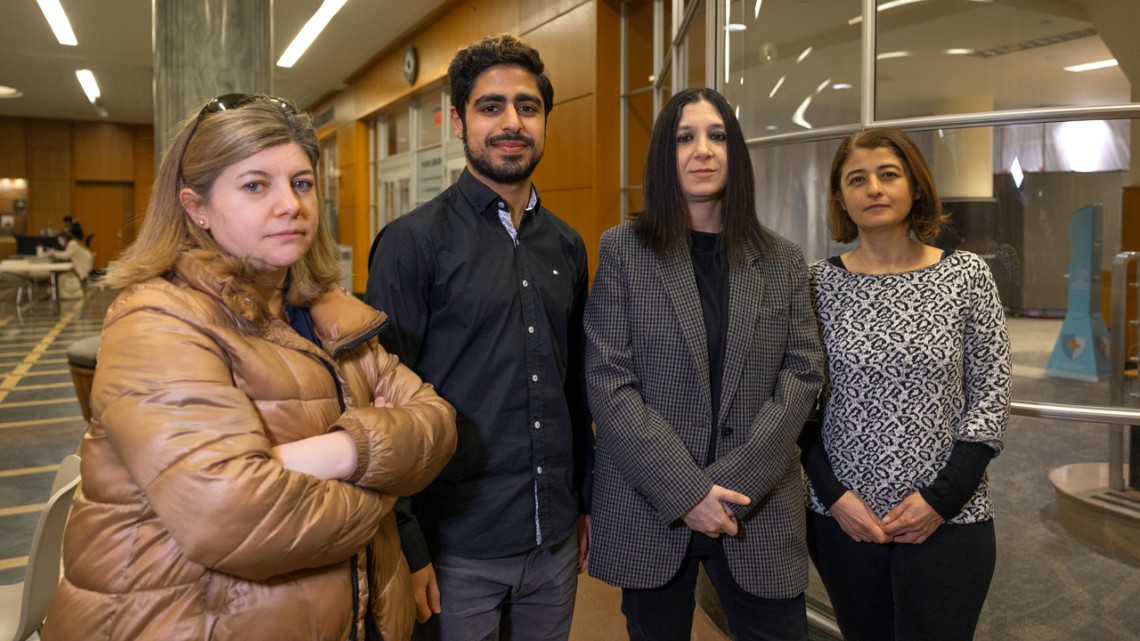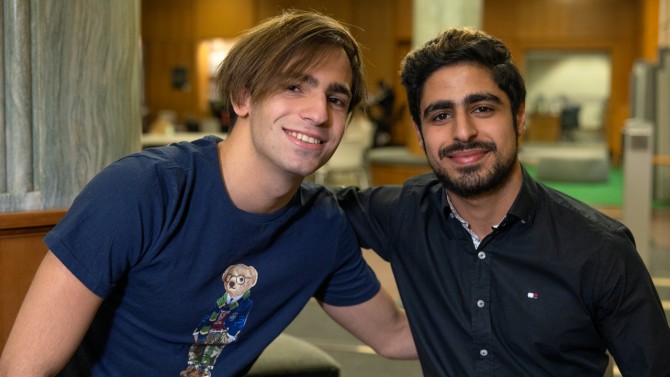
Faculty and students gathered before a support group for students, organized by faculty with ties to Turkey, at Mann Library on Feb. 15. From left, Fatma Baytar, assistant professor of fiber science and apparel design; student Majd Aldaye ’25, a computer science major; Nilay Yapici, assistant professor of neurobiology and behavior and Nancy and Peter Meinig Family Investigator in the Life Sciences; Banu Ozer Griffin, lecturer of Turkish in the Department of Near Eastern Studies.
Campus rallies to support Syria, Turkey earthquake survivors
By Susan Kelley, Cornell Chronicle
The refrigerator moved across the room in Majd Aldaye’s family home in Tartus, Syria, when a 7.8-magnitude earthquake on Feb. 6 became one of the deadliest natural disasters of the century.
“My family and friends all woke up terrified at 4 a.m. The earth was shaking strongly for over a minute, the furniture was moving,” said Aldaye ’25, a computer science major in Cornell Engineering and in Cornell Bowers Computing and Information Science.
The earthquake epicenter was far enough away that his family, friends and most of the people in his hometown are safe. Even so, he said, “It has been very mentally exhausting for everyone,” he said.
Aldaye is one of about 70 students and several faculty members from Syria and Turkey who are grappling with the devastation in their countries.
Before the earthquake, Syria was already grappling with a refugee crisis and over a decade of civil war, which has impeded the rescue efforts. “Neighbors have been getting their neighbors from under the rubble because there were no professional teams sent to help out,” Aldaye said.
Since the earthquake, Aldaye’s family and closest friends have driven daily to the affected area with food, blankets, medication, powdered milk and other aid, delivering it using flashlights because there is no electricity. “I used to get four hours of electricity a day when I was in Syria and now it is worse. Fuel is also extremely expensive and almost nonexistent,” he said. “It’s a totally different level of suffering.”
Aldaye is one of many students, faculty and administrators who have quickly mobilized to create relief efforts and offer each other support.
“The whole nation is traumatized,” said Banu Ozer Griffin, a lecturer of Turkish in the Department of Near Eastern Studies in the College of Arts and Sciences, who is from Turkey.
She and several faculty members with ties to Turkey organized a support group for students on Feb. 15 at Mann Library, as well as a vigil for the victims of the earthquake taking place Feb. 20, noon-1 p.m. at Ho Plaza, starting with a gathering in front of the Cornell Store. From a cultural perspective, “we heal collectively as a nation,” Ozer Griffin said. “We’re trying to create that.”
Wendy Wolford, vice provost for international affairs, sent a message of support to the Ithaca and AgriTech campus communities and the students affected; a web page lists ways to help.
Most of the Cornell students from Turkey and Syria are not from areas that were directly hit by the earthquake. But almost everyone knows someone who has lost a loved one, says Nilay Yapici, assistant professor of neurobiology and behavior and Nancy and Peter Meinig Family Investigator in the Life Sciences (A&S), who is from Turkey.
Feeling helpless, she began reaching out to other faculty members with ties to the region; together they created the support group and the vigil to connect with anyone impacted by the tragedy. “These events aim to bring people together and to face the trauma as a group. It’s important to be together at times of tragedy like this one and not feel alienated,” Yapici said.
International students have come together to put on an Earthquake Disaster Relief Fundraiser Feb. 18, 6-9 p.m., in Klarman Hall’s Groos Family Atrium. Sponsored by the Arab Student Association, Muslim Educational and Cultural Association, Turkish Student Association, and International Students Union, the fundraiser will include cultural activities, food from the region, a live Syrian musical performance and a silent auction, says Taylan Özgür Ercan ’25, president and founder of the Turkish Students Association, who is from Turkey. “We feel like it’s our responsibility to do something.”
The Turkish Students Association also held bake sales and tabled at various buildings on campus to raise funds, said Ercan, an economics major (A&S). “All the time while I’m studying, I’m thinking: What is my responsibility? Can I do anything else?”
Even a small amount of money can help the relief effort, he said. For example, $10 can buy a tent to shelter people who are homeless. “Everything counts,” he said.
So far $178,000 has been raised for the Research Institute of Turkey via a GoFundMe campaign organized by Esra Akcan, the Michael A. McCarthy Professor of Architectural Theory in the College of Architecture, Art and Planning, who is from Turkey.
An architect and an architectural historian, Akcan will speak at the vigil and call for implementation of regulations and more robust inspections and anti-corruption measures in the region’s construction industry to prevent further tragedy related to earthquakes.
She and other students and faculty from the region have found it difficult to focus on their studies and work while their countries are in upheaval, Akcan said. They’ve been experiencing two states of mind, she said: “One is dealing with the feeling of intense unimaginable crisis and disaster invisible to others; the other is performing overwhelming tasks and responsibilities here as if nothing happened. That moment of double consciousness is really very hard to be in.”
Media Contact
Get Cornell news delivered right to your inbox.
Subscribe

